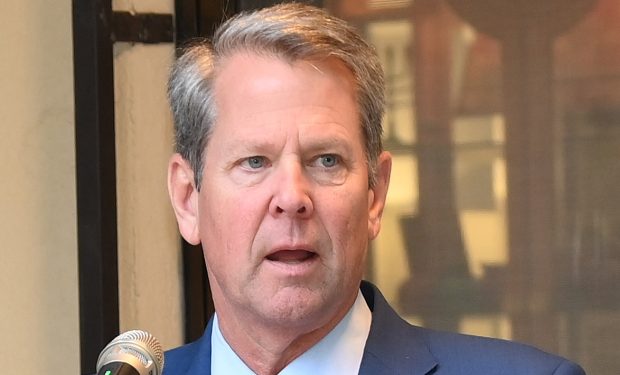Georgia Governor Brian Kemp leads a state that looks increasingly purple, as the blue urban Atlanta bleeds into red rural Georgia — with all the gerrymandering, redistricting and voting restrictions that come with legislators trying to get their color to come out on top.
If you need characters — like in a Marvel movie — to illustrate the polarity of forces animating the Georgia legislative scene, you could do worse than choosing Rep. Marjorie Taylor Greene and Sen. Raphael Warnock as examples of the wildly divergent views espoused by Georgians.
(Outside of Georgia — and by extension Capitol Hill — maybe only Marvel could invent a crossover multiverse where Greene and Warnock inhabit the same realm.)
Saying “we are going to follow the law and the Constitution regardless of who it helps politically,” Gov. Kemp made news this week by shutting down loud calls by Georgia Republicans to sanction and/or remove Fulton County District Attorney Fani Willis, former President Donald Trump‘s bete noir given her sprawling case against Trump and 18 associates accused of attempting a massive vote swindle.
Kemp, a Republican and not one who leans to the center either, has two powerful pieces of political cover for the move — or lack thereof — that put him squarely in the crosshairs of activists in his own party. First, Kemp had prepared for the disruptive scenario by approving a body designed to deal with the inevitable political attacks on law enforcement and the judiciary.
Kemp signed a state law this year inaugurating the Prosecuting Attorneys Qualifications Commission establishing “grounds for the removal or involuntary retirement of a district attorney or solicitor-general from office.”
Willis, as Kemp said this week, so far in his estimation meets none of the criteria outlined for such removal, though he delegates — as part of the law — the ultimate decision to the commission.
Kemp’s other piece of political cover circles back to his purple state status, which means the Governor of Georgia needn’t just be attentive to minority views as a matter of ethical principle, but as a matter of electoral necessity and pragmatic responsiveness to the electorate. While the willy-nilly, politically-pushed removal of an unpopular prosecutor might be run roughshod through a dominantly red state where the minority voice relies on majority ethics and generosity, in Georgia it’s politically more fraught.
For cover here, Kemp can point to that provided by Bishop Reginald T. Jackson, head of the African Methodist Episcopal Church in Georgia. Jackson, who has authority over 500 churches, urged Kemp in a letter not to give in to GOP demands and to maintain the judicial integrity Georgia has fought hard to achieve.
Today, our Bishop along with other faith leaders in Georgia held a Prayer Vigil and Rally for Fulton DA Fani Willis.
— BernieBlack McCauley (@bernieblack) August 23, 2023
(African Methodist Episcopal Church) pic.twitter.com/LAwL55tgBj
To ignore Jackson and cater to headhunting Republicans is to ignore the political realities of Georgia’s electorate.
Kemp has already run afoul of Jackson, signing a Georgia elections overhaul that critics say diminishes the voting power of Black citizens.
Of the election changes, Jackson told the Atlanta Journal-Constitution: “All of this is predicated on a lie that the election was stolen. This is just an attempt to suppress the vote of Black and brown people and at the same time it is blatantly racist. It takes people back to the time of Jim Crow.”
With his letter advocating continued independence and lassitude for Willis, Jackson told Kemp he could, by denying (and decrying) the GOP’s District Attorney threats, “put to rest this divisive, polarizing, partisan and inflammatory attempt to disrupt our state and its people.”
“We strongly call upon you to make it publicly known that you do not support the calls of those who seek an investigation of (Willis),” Jackson wrote to the Governor. With Jackson’s letter in hand, Kemp may sensibly respond to GOP firebrands demanding Willis’s dismissal with a shrug and a nod to realpolitik, saying, “Look, I can’t.”
